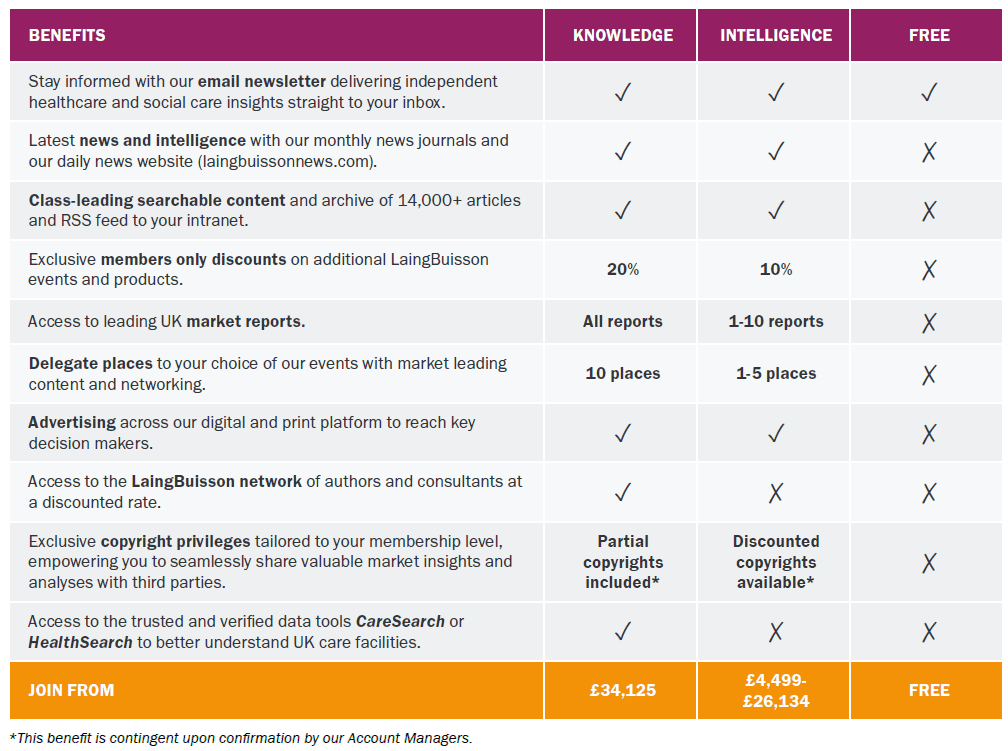Council-paid care home fee shortfalls remain concentrated in the North
Shortfalls are set to worsen next year, with 7% – 8% inflation projected for care home fees
LaingBuisson has released its latest, thirteenth edition of Care Cost Benchmarks (CCB), covering 2024/25 financial data. Refined over two decades of use, care home operators and commissioners rely on the CCB model as the definitive guide to the ‘Fair Cost’ of sustainable care home services for older people, about half of whom have their fees paid by councils.
The former Conservative government recognised in its final years that public sector austerity had led to significant shortfalls in council-paid fees. This new edition of CCB quantifies the current position for each of 151 councils with adult social services responsibilities in England, showing:
- ‘Fair Costs’ of sustainable delivery of nursing and residential care of older people in 2024/25
- Average fees reported by each council for the first months of financial year 2024/25
- The difference between council-paid fees and operators’ costs (shortfalls or excesses)
Fee shortfalls are currently most frequent for residential care. One hundred and seven of the 151 councils reporting data for the first months of 2024/25 are paying less than care homes’ full costs. The remaining 45 councils report that they pay as much or more than the full costs of residential care.
For nursing care, councils are more evenly split, between the 73 paying less than full costs and 78 reporting that they pay as much or more, though CCB highlights a health warning that reported nursing care fees may not be reliable for some councils.
Overall, on the basis of reported average fee levels, LaingBuisson calculates that local authorities in England are underpaying operators of care homes for older people in England by £223 million a year in 2024/25.
Shortfalls are concentrated in the less affluent northern regions of England. Thirty-five out of the 51 local authorities with adult social services responsibilities in the North East, North West and Yorkshire & the Humber pay less than the ‘Fair Cost’ of nursing care for older people while 43 out of 51 pay less than the ‘Fair Cost’ of residential care.
Shortfalls may be as little as a few £s per week or as much as several hundred £s.
Looking forward to the next financial year, CCB projects a challenging environment in which cash-strapped councils will struggle to find the money for 7% (nursing care) to 8% (residential care) fee uplifts if care homes are to maintain their margins faced with two major inflationary pressures:
- The National Living Wage uplift of 6.7% from £11.44 to £12.21 per hour, from 1 April 2025
- The Employers National Insurance increase from 13.8% to 15%, as announced in the Labour government’s October 2024 budget, compounded by the lowering of the threshold at which Employers NI becomes payable, from £175 to £96 per week, which will catch many part-time care workers who currently escape Employers NI by virtue of having earnings below the threshold.
These are the two major factors which will drive care home costs up by 7% to 8% on average, at a time when general economy inflation is settling down to around the Bank of England target of 2%.
Unexpectedly, Oldham Council in the non-affluent North West reports paying the highest average fees paid to independent sector operators for nursing care of older people, at £1,369 per week, after adding in the NHS Free Nursing Care subsidy. Oldham is followed by Kirklees, Trafford and South Tyneside, all at over £1,300 per week. The lowest is North East Lincolnshire at £893 per week, followed by Blackpool, Halton and Knowsley, all at under £1,000 per week for nursing care.
For residential care of older people, the highest average fees are reported by the London Borough of Hounslow, at £1,348 per week, followed by Wandsworth, Richmond Upon Thames and Hampshire, all at over £1,200 per week. The lowest is Halton in the North West at £615 per week, followed by Knowsley, North Somerset, Dudley, Wolverhampton, Southend-on-Sea, Rotherham, North East Lincolnshire and Nottingham City, all at less than £700 per week.
A full schedule of reported average council-paid fees alongside full care home costs (including return on capital and reasonable operating profit) is appended to this release.







